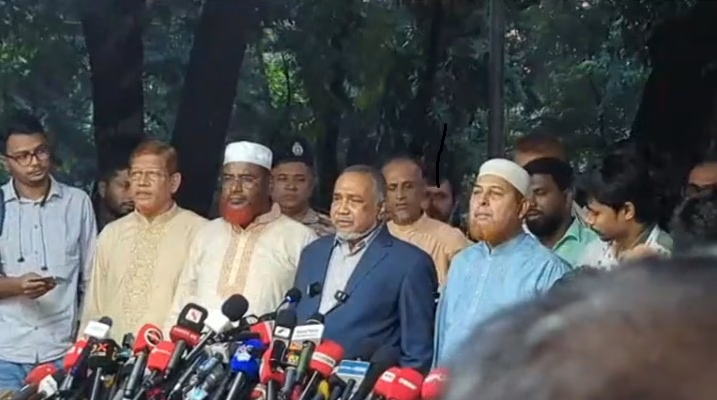Bangladesh Jamaat-e-Islami has demanded a ban on Jatiya Party during a meeting with Chief Adviser Muhammad Yunus.
Jamaat-e-Islami’s Nayeb-e-Ameer and former MP Dr Syed Abdullah Mohammad Taher said, “Regarding the Jatiya Party, I have clearly stated that just as the fascist Awami League has been banned from activities, the Jatiya Party can also be banned in the same way.”
He made these remarks while speaking to journalists after a meeting with the chief advisor at Jamuna on Sunday evening.
Taher said that questions have arisen in the public mind regarding the organisation of a fair election. He alleged that the electoral process is being questioned due to the government’s compromised neutrality.
He stated, “The chief adviser had assured the nation on three matters. One was that he would carry out reforms, address certain issues – reasons why elections in this country are repeatedly questioned and authoritarianism is established. The judiciary would be made visible, and a world-class, joyful election would be held. But given the current situation, we have informed him that all these achievements are now in question.”
He further added, “We told the chief adviser: if you say everything will be fine, but then see irregularities in the election, you will again express regret at night. This cannot happen. This government has not taken any decisions against the occupiers. How can a government that cannot control these things conduct an election? We are concerned about this.”
Taher warned, “A fair election is possible if the situation improves. If there is any deviation, the country will descend into chaos. No blueprint will be implemented in Bangladesh. This government must take initiative to ensure the situation is under control.”
He said, “Out of 31 parties, 25 want elections under the PR system. Some only want it in the upper house, while many, including Jamaat, want PR in both houses. This new election method is essential to prevent the capture of polling centres. If elections are held under pressure, disregarding the majority, the election will be questioned. For us, participating in the election will become constrained.”
Taher further added, “We want elections in February, but these issues must be resolved first. A fair, free, and festive election within the stipulated time is only possible through the satisfaction, consent, and participation of all.”
Expressing concern, Taher said, “The question has arisen whether we are heading toward a blueprint election. The announcement of the election date from London is an unprecedented event. The government’s neutrality has been compromised. If the election is planned, it will become difficult for democracy-loving people to participate.”
Regarding the July Charter, he stated, “In the case of the July Charter, we have reached consensus on 19 issues among all political parties. We consider this a significant progress in building consensus. Unfortunately, a small number of parties are somewhat obstructing the implementation and legal foundation of these 19 consensus issues. They are saying that these will be implemented only when the next elected government comes.”
He raised the question, “If the next government implements these, then why did we waste this time in the Consensus Commission? Then the next government could have taken the initiative for these reforms. Our charter has three parts – one is reaching consensus, the second is providing a legal basis, and the third is implementation. We are united in the spirit of July and continue to strive for its implementation.”
Dr Taher expressed anger over the attack on Nurul Haque Nur, saying, “The way he was attacked. Merely condemning the attack on a hero of the second independence is not enough. New words must be coined for this.” He stated that they have demanded strict punishment for the attackers.


